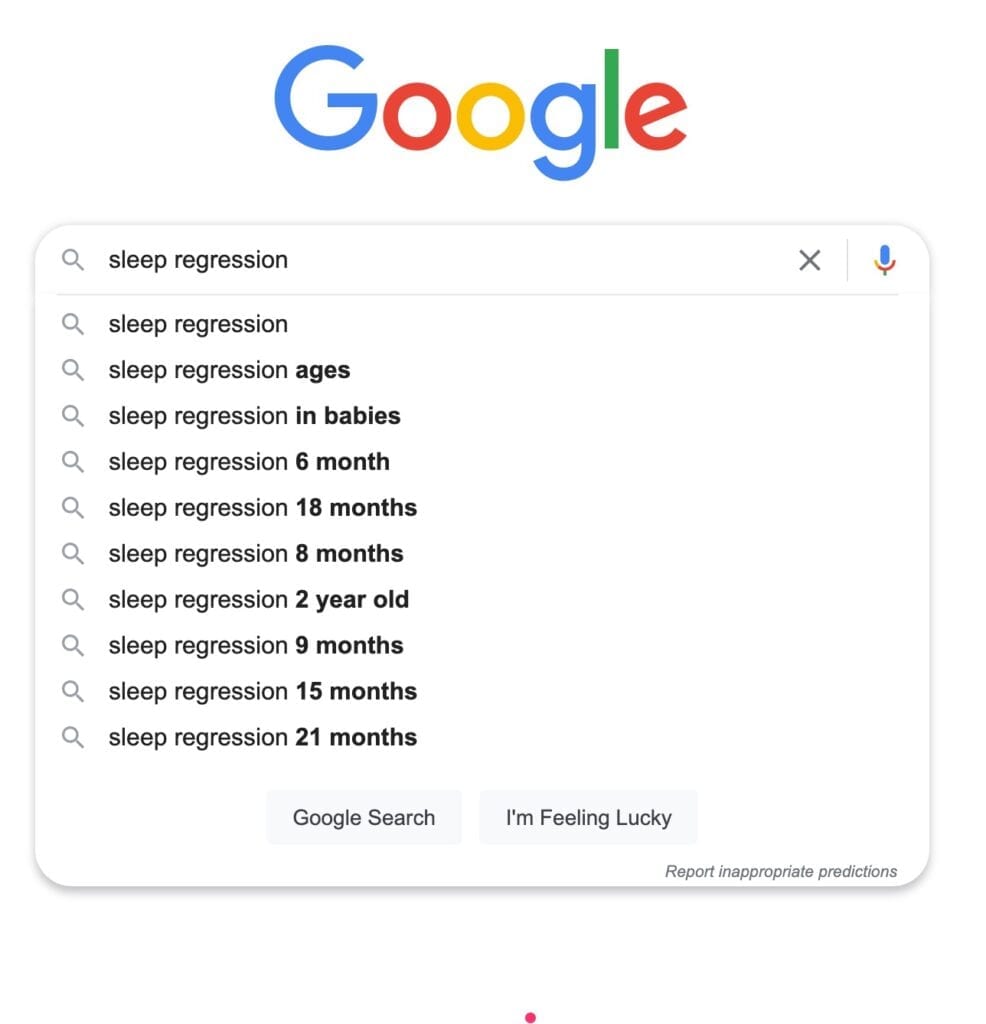A Comprehensive Guide to Sleep Regressions

Sleep regressions– a temporary worsening of your child’s sleep– are a common experience for parents. They are also a common reason I hear from worried parents whose children have finally started sleep well after hard work with myself and our team in the Sleep Clinic. Fortunately, they are pretty easy to address (and often you don’t need to do anything.
Sleep regressions are a common concern for parents. If your child has been sleeping well, and then starts
- Waking up at night
- Fighting at bedtime
- Refusing naps
- Waking up painfully early in the morning
You may be in the the middle of a sleep regression.
In this article, I’m going to cover the problems with the term “sleep regression”, the timing of typical sleep regressions, how to handle them as a parent, and end with a FAQ.
Are Sleep Regressions Real?
I’m going to be honest here– I don’t love the term “sleep regression” because I feel like the term is imprecise. Eagle eyed readers may note that I put the term “regression” in quotes. Am I throwing a bit of shade on the concept? Maybe. . . but tired parents still need help, even if the term is slippery. There’s a lot of talk about sleep regressions happening at certain ages (The “8 month sleep regression!” The “Two Year Old Sleep Regression!”). If you search on Google, you’ll find a ton of search results on this.


If you search the medical literature, however, you won’t find anything.


Why is this? Because it’s terrible when your kid wakes up at night, but it isn’t usually predictable.
Why sleep regressions are often merely a phase
Almost every parent has experienced the frustration of a child sleeping poorly after a period of good sleep. These episodes seem to fit my definition of a phase: an annoying and inexplicable thing your child is doing that will probably get better soon, and that I as a pediatrician don’t have a great explanation for. So let’s call them regressions and be done with it.
Sleep regressions can have a few different forms:
- Babies or toddlers waking up crying
- Bedtime battles or refusals
- Nap strikes
- Early morning awakenings
That being said, I don’t believe in the million different flavors of sleep regressions (the 4.75 Month Sleep Regression! The Left Handed Child who is 9 Months Old Sleep Regression! The Christmas Eve Sleep Regression!) Ok wait, that Christmas Eve one is real.
Here’s a video on more of these weird sleep regressions.
When do sleep regressions occur?
The problem is that there are only certain time periods when sleep regressions seem to predictably occur. Perhaps we could call these the Big Sleep Regressions.
- Potty training and sleep regressions. Potty training usually occurs between ages 3-5 (later for boys then girls). For whatever reason, this seem to be associated with night time awakenings. It makes sense. Children are usually getting a ton of positive reinforcement during the day. Then they wake up at night and are worried about whether or not they can hold it until morning. So they are crying out, either to use the potty, or because they are wet. (Part of potty training readiness is learning to dislike the sensation of a wet or soiled diaper. Early morning awakenings are also common. Here are some nice articles on potty training and sleep from The Baby Sleep Site and Heaven Sent Sleep.
- Major motor milestones and sleep regressions. Like potty training, this seems to be associated with night time awakenings. The most commonly associated milestones include crawling (ages 6-12 months), walking (ages 12-15 months) and pulling to stand (in between these milestones). Imagine how excited you are by being able to move around. Then you have a normal night time awakening out of REM sleep and just wanting to walk but you are TRAPPED IN A CRIB. Terrible, right? That’s when you call for your mom. Fortunately, these seem to get better once your child has mastered the new skill.
- When children are getting ready to get rid of a nap. This is when things get a little tricky. Infants may drop their third nap anytime between 6-15 months of age. Toddlers usually drop a morning nap between 18-24 months of age. And preschoolers give up their nap between 3-5 years of age. Whenever a child STARTS to get ready to drop a nap, they are less tired at bedtime. So, most commonly, children will “fight sleep” by having problems falling asleep when they are taking a nap they don’t really need because they have less sleep drive at bedtime. Less commonly, they may wake up during the night because, again, they got too much of their sleep during the day. If this is the case, they may play quietly in their room.
If you are struggling with naps, I have a guide to nap issues here. And an article on the special flavor of sleep regressions called a nap strike.
What about all the other sleep regressions that you’ve heard about?
Jodi Mindell, one of the best pediatric sleep researchers around, examined the issue of predictability of sleep regressions.
“In 2018, she decided to do her own informal analysis using survey data she’d collected from a prior study she’d published in the journal Sleep in 2012. Dr. Mindell examined the sleep patterns of children aged 6 years and under, looking for spikes in night wakings at specific ages. Her analysis, which was based on data from thousands of mothers but which hasn’t been peer-reviewed or published, turned up nothing. Just 28 percent of the 300 or so parents of 3-month-olds she surveyed had complained about sleep problems (leap 3, according to “The Wonder Weeks”). Just 30 percent of the 300 or so parents of 5-month-olds reported more frequent night wakings (leap 4). Those percentages don’t suggest that all infants follow the same schedule of regression and growth, said Dr. Mindell: “The data clearly indicate that there’s no specific age at which all of a sudden you see a shift in sleep.” (From “Are Sleep Regressions Real?” in the New York Times.)
Remember those Google suggestions from the image above? I think they are often related to transitions away from naps. Which happen at different times in different kids. It’s really variable.
Sleep regressions as a concept feel similar to “wake windows”— an idea that has a lot more traction among sleep consultants and on parent message boards than in the scientific literature. It doesn’t mean that
What do I do if my child has a sleep regression?
Although I’m not that fond of the term, there is no doubt that many parents struggle with these unpredictable events. A few bad nights is unfortunately sometimes just the cost of doing business as a parent. Many parents who have been enjoying the hard-won fruits of a sleep training battle are justifiably freaked out when their sleeping angel becomes a little devil again.
The first step is not to panic. In my experience, anywhere from 1-3 nights of sleep difficulties happen periodically without a clear cause. I would wait and keep doing what you are doing– keep the same schedule, comfort your child, and just try to wait it out. Sometimes kids just do annoying things.
But if it persists for longer than that, it runs the risk of being a bad habit. This is especially true if your reaction makes things worse. One example of this is starting to take your toddler into bed with you if they start waking up at night. Guess what? Your toddler really likes spending time with you. And they will likely start waking up to come into bed with you.
If you are a video person, here is a quick video on this material, taken from Episode 4 of the Sleep Edit Podcast:
So, if your child’s sleep behavior is disruptive and last for a few days, you might want to deal with it.
Here’s how to handle a sleep regression, regardless of your child’s age
- Rule out a medical cause. Is your child cutting a tooth? Does she have a cold or signs of an ear infection? Is she constipated? (Constipated kids don’t sleep well. I’m not sure why. As I tell my patients, I’m an “above the waist” doctor). Symptoms like snoring or complaining about leg pain at night can suggest medical causes of sleep problems. If in doubt, call or visit your friendly neighborhood pediatrician.
- Take inventory of your sleep practices. Have you gotten a bit lazy in your bedtime routine– are you varying the time and sequence of events? Are you lying down with your child to fall asleep at bedtime when he used to fall asleep independently? Are you bringing him into your bed at night? If so, you need to go back to basics. Have a set bedtime routine every night at the same time and leave before your child falls asleep. If this is difficult, there is a whole host of techniques you can use. Specifically, if you’ve started co-sleeping, here’s how you can stop.
- Look at your child’s sleep duration at night. Maybe you read Weissbluth’s book and your child goes to bed at 6pm every night and you expect her to sleep until 6 AM and take two two hour naps. Maybe this worked in infancy, but your two year old won’t sleep for sixteen hours a day no matter how much you want her to. Track your child’s sleep for a few nights and consider adjusting her time in bed. Check your expectations versus the actual sleep requirements expected of a child that age. You may need to drop a nap (terrifying, I know) or move bedtime later.
- Consider how you are responding in the middle of the night. If you are bringing your child into your bed you need to stop. You could consider the bedtime pass, where you give your child a pass to leave her room 1-2 times per night. After this you return her to her room without contact. Weissbluth also talks about the silent return– if your child shows up to your room, bring her back to her room without comment. You may need to do this 20-30 times for a night or two. It feels crazy but it will work quickly if you are consistent. Here’s a review of my favorite sleep training techniques.
- Be patient. Generally these issues DO improve if you do nothing.
- Consider bringing in a pro. A sleep consultant or sleep physician may be helpful if none of this work. I hate to toot my own horn, but check out my book as well— if you followed the steps in my book, I suspect your child will be falling asleep and staying asleep fairly quickly.
FAQ and tips on sleep regressions
What is the first thing parents should do if their child is now having sleep issues?
Check and see if your sleep habits have slipped a bit. Is bedtime later or more variable? Are you being lax with your bedtime routine?
How long can we expect sleep regression to last?
Usually they are pretty brief— say, less than a week.
If your child’s sleep regression is so disruptive and doing nothing is just not working, what can we do to make it come to an end?
It’s time to go back to basics and make sure that you have a high quality bedtime routine and that you do the minimum you need to to soothe your child. I would also check in with your child’s pediatrician.
Can they be prevented? For example, when you’re about to potty train your child, can you prepare for a possible sleep regression and stop it from happening?
I would double down on your high quality bedtime routine and also make sure that you going to be extra careful about respect your child’s bedtime and sleep schedule.
What can we avoid doing so we don’t make sleep regression worse or last longer than it needs to?
Make sure that you are not inadvertently causing the regression by giving too much attention. For example, if your baby starts crying at night and you then start giving him a bottle every night, you will likely cause the problem behavior to continue.
Are kids going to go through a sleep regression? Are some more likely than others?
There’s very little research on sleep regressions— as noted above, the term is poorly defined. As a parent, I can tell you that children frequently regress in many domains, just when you think you have things figured out.
What are medical causes we should be on the lookout for?
Often the common cold may present with a sleep problem first. I’ve asked myself on many occasions, “why is my kid doing this weird thing?” and then a day or two later he will get a cold.
Snoring and complaints about legs can represent medical causes of sleep disruption and should be discussed with your pediatrician.
How do you tell the difference between “regression” and an issue like teething or a fever that might cause interruption in sleep patterns?
Often, it’s not obvious until a day or two later, as noted above.
What are good sleep practices for kids that we should make sure to faithfully implement so we all get a good night’s sleep?
- A consistent bedtime routine that happens at the same time every night
- A plan for what to do if your child wakes up during the night.
- Understanding that your child, like everyone, is entitled to a bad night of sleep once in a while. You don’t need to panic if your kid has a few bad nights.
Further reading
Here is a nice article in Romper about sleep regressions.
Have you experienced a sleep regression? Tell us about it– what happened and how did you fix it? Write it out in the comments below.




